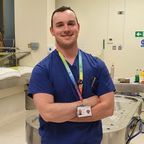Support Staff
Learning and training support for the Certificates of Achievement
Biomedical support staff
Learning and training support for the Certificates of Achievement
1pm – 1.30pm BST, 26 September 2023 ‐ 30 mins
Biomedical support staff
Abstract
The IBMS Certificates of Achievement are designed as gateway qualifications to reflect the training needs of people working as Assistant Practitioners or Associate Practitioners in laboratory services.
In this ‘show and tell’ session designed for trainees, training officers, training managers or laboratory managers, we will outline the structure of the Certificates of achievement and give some information on the support and guidance that the IBMS currently offer for completing both parts of this qualification. We will interactively explore how the resources available as a result of our recent collaboration with LearnSci can supplement the existing training matter you have in your laboratory, to help you scaffold and deliver engaging, supportive and enjoyable training experiences to those completing this qualification.
We will also canvass the views of everyone present in this talk to better understand the needs of each group and to gain insight into the resources and support that attendees would find useful, to help the IBMS drive the evolution of this qualification by ensuring it remains relevant and useful to practitioners.
Speakers

The purpose and value of level 2 and 4 apprenticeships
Biomedical support staff
The purpose and value of level 2 and 4 apprenticeships
1.30pm – 2pm BST, 26 September 2023 ‐ 30 mins
Biomedical support staff
Abstract
This talk will focus on how level 2 and level 4 apprenticeships can help to engage in widening participation and EDI agenda as well as create an entry level workforce pipeline and staff that can be grown through apprenticeship progression routes into the Biomedical science profession.
Speakers
Jemma Lenton
Northeast and Yorkshire Apprenticeship Project Lead, Health Education England
Expanding your role into Point-of-Care Testing – a career opportunity to consider
Biomedical support staff
Expanding your role into Point-of-Care Testing – a career opportunity to consider
2pm – 2.30pm BST, 26 September 2023 ‐ 30 mins
Biomedical support staff
Learning outcomes
Over the past 10-15 years the profile of point of care testing has been on the rise. More recently in response to the pandemic through the regular use of lateral flow tests by the public, coupled with the need to create under intense pressure, streamlined patient pathways using Point of Care testing (POCT) devices. This has further brought POCT into the limelight, as a result, there has been a marked increase in interest and use of near patient testing in hospital, acute and community settings. Flexible and innovative, POCT is now recognised at the same level as traditional laboratory medicine, evidenced by its recent inclusion in the 15189:2022 laboratory accreditation standards.
Whilst both professional and industry profile of POCT is booming, interest in POCT amongst laboratory support staff as a potential future career choice remains a hidden gem. The aim of the presentation is to change that!
Providing a personal, unabridged insight into the world of POCT the presentation will explore the scope of work in a POCT service; address the common perception of POCT vs. the reality; highlight the different skill sets that are both supported and developed, and finally look at opportunities available for laboratory support staff in POCT.
Listeners will gain, at the very least, knowledge of the choices available to them and at best ignite interest in this truly dynamic field of laboratory medicine.
Speakers

Freeda Millet
Senior Biomedical Scientist- POCT , The Royal Marsden NHS Foundation Trust
Workshop: First impressions last the longest – how to be the best public face of your laboratory
Biomedical support staff
Workshop: First impressions last the longest – how to be the best public face of your laboratory
2.30pm – 3.30pm BST, 26 September 2023 ‐ 1 hour
Biomedical support staff
Abstract
This session is aimed at staff who are on the front line of Pathology services. Those who are in sample reception, taking calls and frequently being the interface between Pathology and our users.
Human beings are built to size each other up quickly. These first impressions are influenced by a number of factors, such as facial shape, vocal inflection, attractiveness, and general emotional state. People tend to get attached to their initial impressions of others and find it very difficult to change their opinion, even when presented with lots of evidence to the contrary.
As a result, it’s important to be aware of how we come across to others during a first meeting. Then we can employ impression management skills—modulating any irritating traits and accentuating one's strengths—to ensure that people have a more favourable opinion of one. Everything from clothing style and posture to conversational topics can be adjusted to form a better first impression.
It takes a mere seven seconds to make a first impression. People thin-slice others based on how a person looks and sounds, more so than their explicit verbal statements. Often, someone's first impression is influenced by implicit attitudes of which they are unaware, which explains impulsive actions like giving special preference to those with physical beauty or more easily trusting a person who has a babyface. The observational powers (biases) of the observer are just as important as the qualities projected by the target, or person being judged, making these judgments a constant dance between objective information and selective signal-reading
This presentation will create awareness of our own and others first impressions and allow us consider how to make a good and lasting first impression.
Speakers
Denise Cook
Head of Governance, Quality and Service Improvement , Berkshire and Surrey Pathology Services (BSPS)

Sue Alexander MSc MSc MBA CSci FIBMS CBiol FRSB MIHM MCQI CQP
Chief Examiner Leadership & Management, IBMS
Key skills for a supervisory role
Biomedical support staff
Key skills for a supervisory role
4pm – 4.30pm BST, 26 September 2023 ‐ 30 mins
Biomedical support staff
Abstract
There is a tendency to promote staff into supervisory roles and then allow them to find their feet on their own as the are faced with managing staff and taking on more responsibility. Departments tend to be very good and training these supervisors on how to perform tasks such as rotas, overtime payments, etc. but assume they have the necessary skills to mage and lead staff.
Often these supervisors look to role models from managers they have worked with or for and Tv (the apprentice, shudder) to help them developed their interpersonal skills. Sonic healthcare UK has recognized this as an opportunity to help with the development of all grades and has a novel training program to aid in supporting management and leadership skills. This will be discussed in this lecture.
Speakers

Dr David Ricketts DBMS CSci FIBMS
Head of Laboratory Process Improvement, Health Services Laboratories LLP
A role with a difference – anatomical pathology technologist in a mortuary
Biomedical support staff
A role with a difference – anatomical pathology technologist in a mortuary
4.30pm – 5pm BST, 26 September 2023 ‐ 30 mins
Biomedical support staff
Speakers






